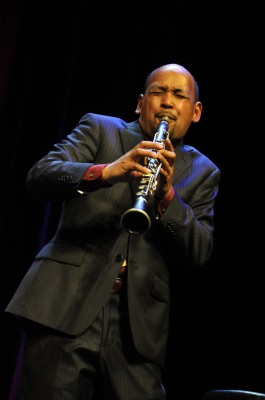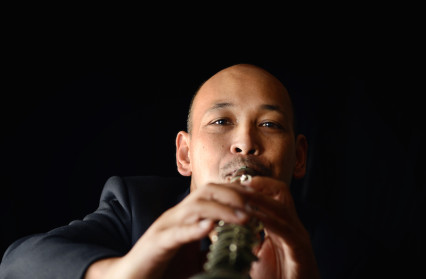Abergavenny Borough Theatre, October 1 2015
Evan Christopher (clarinet), Don Vappie (solo guitar, banjo, vocals), Dave Kelbie (rhythm guitar), Sebastien Girardot (bass)
Jelly Roll Morton was less significant as a self-styled ‘inventor of jazz’ than as an original bandleader, composer and pianist with a view about how the music should sound. To some, that also was part of his relentless braggadocio. But such musical matters have their context and, for Morton in New Orleans in the first half of the 20th century, certain exotic influences had to be paramount, notably the sounds wafting in from Cuba, South America and the wider Caribbean: the ‘Spanish tinge’, as he called it. He himself was Creole. It’s difficult if not impossible to imagine the cacophony from which jazz eventually emerged as something definable and exportable worldwide. Morton, however, was adamant: if it didn’t have Latin America in the mix it wasn’t jazz.
New Orleans was not only where the clarinettist Evan Christopher moved to in 1994 from California, but also the place from which he decamped in 2005 as a result of being displaced by the floods that followed Hurricane Katrina. He went to live in Paris on a formal cultural exchange and based the resumption of his career there on another conjunction of styles, this time in the French capital itself where, in the late 1930s, visiting American musicians such as Duke Ellington wanted little other than to meet and perform with the gipsy guitarist Django Reinhardt, who was playing a new kind of European jazz inspired by their example.

The result of Christopher’s interest in those 75-year-old gatherings was the band Django à La Créole, which has recorded three award-winning albums. The Ellington-Reinhardt partnership also made records, but any outside association with Reinhardt’s bloated and unpredictable personality was never going to travel far. In fact, DÀLCréole has in a way been more successful in fusing a lighter version of Django’s percussively virtuosic style with New Orleans music as envisaged by Morton. So much so, that the first number at this opening concert of its UK autumn tour was the Reinhardt classic Douce Ambience, performed in a shuffling, Latin American mode – Django ‘Creolised’, as it were. Moreover, solo guitar was the responsibility this time of New Orleans musician Don Vappie, who was to deepen the Crescent City colour by also performing on banjo in a style not normally associated with the instrument as a minstrelsy staple.
For this tour, Vappie and Christopher are joined by guitarist Dave Kelbie and bassist Sebastien Girardot. Kelbie slipped easily from strumming four-in-a-bar to the syncopations of less driven dance beats, and Girardot’s slap bass, perhaps overdone at times, harked back to the Ellington band of the Harlem Renaissance, which featured Barney Bigard as its wooden-stick maestro. Bigard made recordings with Reinhardt, famously of Ellington’s tune ‘Finesse’, which here slipped from Ellingtonia to Afro-Cubana in a neat conflation of styles. Vappie also sang a few songs: in Creole-French for ‘Salee Dame’, after giving up trying to explain, for instance, the difference between Cajun and Creole (stylistic admixture can be complicated) and in straight Mortonese for ‘Careless Love’. In all these performances Christopher’s clarinet spoke for the band’s ethos in evoking not only Bigard but the early New Orleanians such as Jimmie Noone and George Lewis, as well as Reinhardt’s clarinettists, Hubert Rostaing and Gérard Lèvêque.
It was perhaps a boon that Vappie did not attempt to imitate Reinhardt as so many sub-Django guitarists do with varying degrees of accomplishment. Instead he offered his own take on tunes as familiar as ‘Manoir De Mes Rèves’ and ‘Swing 42’ when playing guitar, and supplementing Kelbie’s chugalongs with strong chordal accents of his own when Christopher was up and about. There’s plenty to pursue in Christopher’s Americo-Parisian concept, not least the case of other US musicians, such as Sidney Bechet, who found Paris and Parisians sufficiently amenable for them to want to take up European residency. Bechet’s Haitian rumba, ‘Tropical Moon’, marked the connection. That the band is comfortable with the concept and can play around with it was evident when exchanges between Christopher and Vappie in Hoagy Carmichael’s ‘Jubilee’ drew to a close with a quote, albeit brief, from Reinhardt’s ‘Belleville’. In our more charitable moments, we reserve for such insouciance the name of genius.
Header photo: credit Ima Garmendia



 Enjoyed this article? Support our writers directly by buying them a coffee and clicking this link.
Enjoyed this article? Support our writers directly by buying them a coffee and clicking this link.







